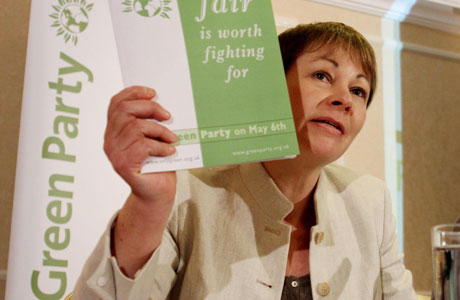4 Things the Green Party Are Not
 With any success, criticism and accusations inevitably swiftly follow. The current #greensurge is no exception.
With any success, criticism and accusations inevitably swiftly follow. The current #greensurge is no exception.
Bearing this in mind, here’s a few myths surrounding the Greens cleared up:
1. ‘Vote buyers’
The Greens usually get this launched at them over their pledge to scrap tuition fees – something we’ve been told endlessly is something we simply can’t afford, but let’s take a step back for a moment and look at the implications of such accusations.
Most people (excluding the ‘career’ politicians simply after power, a group smaller than most think) enter politics to make people’s lives better, something that will usually require at least a little bit of money. If we start to hound those that wish to actually spend money on their policies, what we’re probably going to end up with is a bunch of politicians not actually offering any progressive policies. Sound familiar?
But even if she wanted to (which she doesn’t), there’s simply no room for GPEW’s Natalie Bennett to go on a power-hungry pledging spree, promising the world to the electorate in exchange for a more colourful make-up of the Commons next May.
The Greens don’t work like that- every single policy is decided at conference by the membership- no ruthless career politicians here, just ordinary people like you or me. This means that any policy you find in a Green manifesto (which are fully costed) has been debated by its members, and they have decided collectively that it’s the best thing for the country, with any concerns heard and considered. Now this won’t always guarantee perfect policies, but it does seriously undermine the ‘buying votes’ narrative that certain unimaginative opponents have been attempting to spin.
2. A ‘Ukip of the Left’
The headlines need a cheeky name to refer to us as, and indeed we do appear to have come out of nowhere to be surging in the polls, worrying the main parties, much like UKIP – but this is where our similarities end. We are not a UKIP of the left, of the youth, or of anything else.
We offer a progressive and inclusive form of politics that appeals to people’s hopes, not their fears, a party committed to long-term, genuine solutions, rather than rising to success off the back of short-term, populist rhetoric. We strive for a united society, not a divided one. Our members are drawn to us because of our holistic, alternative policies, rather than blind rage or misplaced prejudices.
If we are anything to UKIP, we are its antidote.
3. ‘Middle Class Nazis’
This one came as a shock to me too, but it’s impeccably reasoned: Hitler had a few trees planted in between slaughtering millions and waging war on the rest of Europe; the Greens are all for trees, therefore the Greens are Nazis.
Whilst obviously ridiculous, this is one of the amusing results of a more sinister problem. Labour are pursuing an energetic campaign of politically illiterate and increasingly desperate smearing of the Greens. They’re attempting to pit environment against societal change, and sully the Greens record, all to combat the #greensurge. For the latter all they have to point to is Brighton’s infamous Green council, which is excellently defended here.
As for the former, it relies on completely ignoring the Greens vastly more radical approach to tackling inequality; a £10 an hour minimum wage; a wealth tax; pay ratios; a citizen’s income – not to mention placing the ultimate authority for decision making into the hands of all of its members – how do Labour stack up to that?
These policies are born out of a realisation that halting the impending environmental disaster depends upon a radical departure from the current economic and societal structures – something all the other parties completely fail to recognise. Our economic system is a catalyst for both climate change and inequality, and in offering an alternative we are presented with an opportunity to tackle both at the roots.
As our members have realised this, so our policies have developed into a real progressive alternative, placing equality, sustainability, and democracy at the heart of our values. As we’ve done that, so our demographic has begun to change, attracting working class and minority groups.
4. A ‘Wasted Vote’
There are many places where the Greens actually have quite a good shot at winning outright, including Brighton, Bristol and Norwich, but you don’t necessarily need to have your candidate voted in for your vote to have made a difference. Already we’ve seen an increased projected vote share of the Greens impact Labour’s pitch and promises, and it won’t stop there.
But ultimately voting is not a bet where you’re guessing which party will win and your vote ‘counts’ if you got it right. It’s about having your say in how the country should be run, on what values we should be fighting for, over what matters most to you. Tactical voting has been the norm for decades, and look at what it has brought us- isn’t it time we had the courage and imagination to make things genuinely better, to fight for a real alternative?
If you use your vote for anything other than that, that’s when you’ve wasted it.




You might link to https://glasalt.wordpress.com/2015/01/03/why-i-think-we-should-make-tactical-voting-history/ in support of the “wasted vote” myth – it’s good!